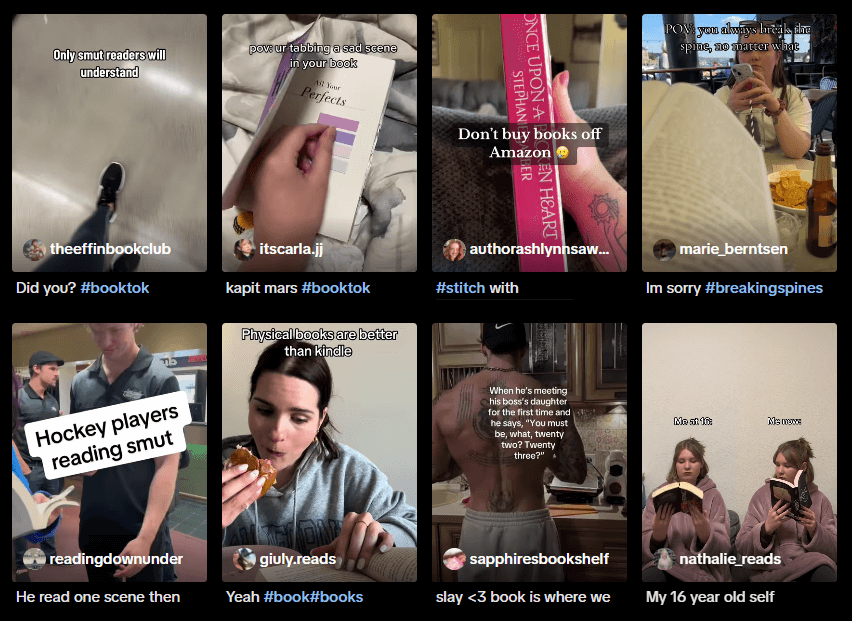
Last week, I bought a new toaster. But before I clicked “Buy Now,” I obsessively checked the reviews of every model that caught my eye. I scanned star ratings, dug into paragraphs of praise and complaints, and weighed one reviewer’s burnt toast horror story against another’s flawless bagel test.
And somewhere between scrolling and comparing, I had a funny thought: Who are these people with enough time and motivation to leave such detailed product reviews?
But maybe that’s not even the right question. Maybe the better one is: What was it about these toasters that made people care enough to log back into Amazon, search for the product again, and type out a multi-paragraph review unprompted?
Because if I’m being honest, once I get something, and it does what it’s supposed to, I just move on with my life. No review. No “thank you.” Just next.
Then it hit me. If it takes that much effort just to get someone to write a review about a toaster, how much harder is it to get a review for a book? Especially a book by an unknown author with no publisher behind them.
Convincing someone to read my novel in the first place is already like pulling teeth. Getting them to review it afterward? That feels like asking them to write a college essay… for free.
So, I usually settle for silence. No feedback. No engagement. No reviews. And as every indie author quickly learns, silence is the death of momentum. Without reviews, your book might as well be invisible.
If you’re trying to figure out how to get book reviews for your self-published book, you’ve clicked on the right link. Reviews are a survival tool for authors. They build trust, influence buying decisions, and help the Amazon algorithm push your book into the hands of new readers.
No matter how good your cover is, how catchy your blurb sounds, or how tight your writing is, if your book has no reviews, most readers will skip right past it.
Let’s change the silence. Let’s talk strategy.
Why Book Reviews Matter (Especially for Indie Authors)
Again, you could have a killer blurb, a professionally designed cover, and a five-star story, but without reviews, readers will hesitate.
Why? Because reviews are social proof, and people trust what others say far more than what you say about your own work. You can call your book a masterpiece all day long, but if no one else is saying it, potential readers will scroll right past.
Think about your own buying habits. You wouldn’t book a hotel with no reviews, right? Or buy a $20 gadget on Amazon that has zero stars and no feedback? The same logic applies to books.
In fact, according to a 2024 survey by BrightLocal, 74% of consumers check review sites before making purchase decisions. That’s not just a vague preference—that’s nearly everyone.
And when it comes to books, Amazon reviews play a critical role in whether your title gets noticed or buried. The more high-quality, verified reviews you collect, the more likely Amazon’s algorithm is to take your book seriously.
One honest review a week is better than twenty fake ones from people who didn’t read past chapter one.
This is how books land in “Customers Also Bought” or “Top Picks” sections. It’s not magic. It’s math. Amazon promotes what it knows people are engaging with. No reviews? No data. No data? No visibility.
This is especially true for indie authors who don’t have a traditional publishing machine behind them. You’re doing the marketing yourself, and reviews are one of the few tools you have that keep working for you long after launch day.
As Jonah Sachs, author of Winning the Story Wars, once put it, “Your brand is a story unfolding across all customer touch points.” This means marketing is no longer about the stuff you make but about the stories you tell.
And your reviews? They’re part of that story. Each one is a reader raising their hand and saying, “This was worth my time.” And when enough people say that, new readers start to listen.
When Should You Start Seeking Reviews?
Start early—before your book is even published.
I know the temptation to wait until everything is perfect. But if you’re serious about building momentum from day one, you want reviews waiting for readers on launch day, not weeks or months later when your book has already started to slip off the radar.
This is where Advance Reader Copies (ARCs) come in. Think of ARCs as sneak previews for your most trusted readers. They’re your behind-the-scenes hype crew.
Creating and sending out ARCs during your pre-launch phase is one of the smartest moves you can make. Not only does it give you time to gather reviews before the public sees your book, but it also creates early buzz.

Some of those ARC readers will post on Goodreads, talk about your book on social media, or even mention it in blogs or BookTok videos. The sooner you share your work, the sooner people start talking about it.
I always advise authors to start with a small team of beta readers. These are your early eyes—the ones who help you polish the rough edges. They don’t just catch typos; they spot plot holes, pacing issues, and places where your characters might fall flat.
Once you’ve incorporated their feedback and your manuscript is in top shape, shift gears and recruit your ARC readers—people who are genuinely excited to read your finished product and who are ready to leave honest reviews the moment your book goes live.
Trust me, the best time to seek reviews isn’t when the book is already out there struggling to be noticed—it’s weeks before the launch, when you still have time to create buzz and line up support.
Where to Get Book Reviews (Free and Paid Options)
Here’s where the real work begins. Publishing the book was hard enough, but getting people to read it and leave a review? That’s the real uphill climb.
The good news is that there are plenty of ways to get book reviews for self-published books without begging or breaking the bank. Whether you’ve got a zero-dollar budget or you’re ready to invest a little, these strategies actually work if you commit to them.
Build a Review Team
Think of this as your book’s personal street team, the folks who’ll help get the word out before anyone else does. These are readers who genuinely love your genre and are willing to read in exchange for an honest review.
They don’t need to be influencers or bloggers. They just need to be readers who are excited about your work.
You can find them by building an email list (even if it’s small), writing communities you’re active in, and talking to past beta readers who already know your voice.
Use tools like BookFunnel or StoryOrigin to distribute Advance Reader Copies (ARCs) safely and professionally. These platforms also help you track who downloaded your book and whether they followed through.
Don’t overcomplicate the process. Send short, polite reminder emails, include direct links to review pages, and always thank them personally. A little gratitude goes a long way.
Reach Out to Book Bloggers and Reviewers
Book bloggers still matter—a lot. Especially in niche genres like sci-fi, cozy mystery, historical romance, or horror, bloggers have loyal readers who actually pay attention to their recommendations.
You can find active reviewers on The Book Blogger List, Indie View, or Goodreads reviewer profiles.
Don’t mass-email a hundred bloggers with the same bland message. Personalize your pitch. Let them know why you picked them, include a brief description of your book, a clean cover image, and a clear ask.
One of the best pitches I ever sent started with, “I saw you loved [insert book title], and I think mine might hit the same emotional notes.” And it worked.
Use Review Platforms Like Goodreads and NetGalley
Goodreads is still one of the most powerful platforms available to self-published authors. Hosting a giveaway can generate exposure and help you connect with readers who actually leave reviews. Joining genre-specific Goodreads groups is another underused tactic. Just be present, not pushy.
NetGalley, on the other hand, is a bit more advanced. Yes, it’s paid, but it puts your book in front of librarians, educators, and serious reviewers.
If you’re bootstrapping, try more affordable alternatives like BookSirens or Reedsy Discovery. They’re great for attracting high-quality reviews without the steep NetGalley price tag.
I’ve seen authors give away 50 digital copies through these platforms and walk away with over 30 honest, thoughtful reviews, some of which later appear on Amazon, too.
Tap Into Facebook Groups and Reddit
There are dozens of Facebook groups built specifically for indie authors and reviewers. Some are ARC-based, some are genre-specific, and some are review swap communities (though be cautious with swaps because Amazon doesn’t like them).
Try searching for: “Review My Book,” “Self-Published ARC Team,” or “Indie Authors Unite.”
Reddit is another hidden gem. Communities like r/selfpublish, r/books, and r/indieauthors are active and open to well-crafted posts that offer value.
But the key is not to just drop your book link and run. That screams “spam.” Instead, share what you’ve learned, contribute to discussions, and casually introduce your book when it’s relevant. People respect authenticity, and that goes a long way.
Contact BookTok and Bookstagram Influencers
If you’re not using TikTok or Instagram to promote your book in 2025, you’re leaving reviews (and money) on the table. BookTok in particular continues to explode, especially for romance, fantasy, and young adult fiction.

But don’t chase big influencers. Focus on micro-influencers with 5k–20k followers. They’re more accessible and often have a stronger connection with their audience.
Send a short, kind message offering a free copy, along with a media kit if you have one. Be clear you’re not asking for a glowing review, just an honest one.
Don’t offer money for positive feedback. That’s against FTC and Amazon guidelines. Instead, build authentic relationships. Comment on their posts. Share their reviews. Treat them like collaborators, not marketing tools.
Ask Your Email List and Website Visitors
Your mailing list isn’t just for launch announcements. It’s one of the most powerful tools you have for building a review base, because these are people who already like and trust you. Don’t be afraid to ask. Keep it short and sincere.
One of the best tricks I use is placing a review request at the end of the book itself. Something like this: “Enjoyed the story? A quick review on Amazon or Goodreads makes all the difference. It helps other readers find the book too.”
It’s subtle, but it works. Readers who loved your book are often happy to leave a review—they just need to be reminded.
What to Include in Your Review Request
So you’ve got someone to read your book. Great! Now comes the part that feels awkward for most self-published authors: asking for a review.
But don’t overthink it. You don’t need a long, emotional plea or a cleverly worded campaign. You just need to be kind, clear, and make it as easy as possible for them to follow through.
Here’s the formula that works:
- A warm thank-you for their support
- A short summary or hook about the book
- A clear request: “Would you mind leaving an honest review on Amazon or Goodreads?”
- A direct link to the review page
Keep it short. Make it friendly. And never pressure them to write a five-star review. That backfires more often than not.
The best time to seek reviews isn’t after your launch—it’s weeks before it.
Readers can smell desperation a mile away, and if you make it sound like their review has to be glowing or else, it’ll only make them hesitate—or worse, feel manipulated.
In my experience, the most effective review requests sound like something you’d say to a friend. No scripts. No corporate tone. Just a simple, human ask: “Your thoughts would mean the world to me—and they could help another reader decide if this book is for them.”
And always include that direct link to the review page. Don’t assume they’ll go looking for your book. The fewer steps it takes, the more likely they are to follow through. Think of it like handing them a plate of food. Don’t make them cook.
What NOT to Do When Asking for Reviews
Let’s get this out of the way because these mistakes are more common than you’d think, especially among first-time self-published authors trying to get book reviews fast:
- Don’t offer cash in exchange for reviews. Pay a few bucks to get a glowing review—problem solved, right? Wrong. That’s a direct violation of Amazon’s rules, and it can get your book flagged, removed from listings, or your entire author account banned. Once that happens, it’s incredibly hard to recover.
- Don’t write fake reviews. Amazon’s bots are way more advanced than most people realize. They can detect suspicious behavior patterns, IP overlaps, and even stylistic similarities. And if readers suspect the reviews are fake? That damage to your credibility is permanent. Readers are smart and skeptical.
- Don’t do review swaps with strangers. You might see fellow authors in Facebook groups or forums offering “honest review exchanges.” It sounds harmless, but it often triggers algorithmic red flags, especially if the swaps aren’t organic or the books aren’t actually being read. These unnatural patterns are exactly what Amazon watches for.
Instead, just be real. Be upfront. Ask for honest feedback, even if that means you’ll get the occasional three-star review. In the long run, authenticity wins.
Focus on building long-term trust with readers, not chasing shortcuts. A handful of genuine reviews is always better than a dozen fake ones, and your reputation as a self-published author will thank you for it.
How to Deal With Negative Reviews
You’re going to get a bad review eventually. It’s inevitable. Someone, somewhere, will read your book and decide it wasn’t for them. Maybe they didn’t like the pacing. Maybe your characters reminded them of their ex. Maybe they were just having a bad day. Either way, it’ll sting.
And when it happens, don’t panic. Don’t respond defensively. Definitely don’t argue, even if you feel misunderstood. I’ve been there—hovering over the reply button, crafting the perfect comeback that would surely change their mind.
But it never ends well. Readers aren’t looking for drama; they’re looking for authenticity.
Negative reviews—even unfair ones—are part of the landscape. In fact, they can actually help. A mix of glowing and critical feedback makes your review section look more legitimate.
Think about it—when you scroll through Amazon and see a book with only perfect five-star reviews, don’t you get a little suspicious? A few three-star (and even one-star) reviews show that real people are reading your work—and reacting to it.
As author Brené Brown once said, “If you’re not in the arena getting your ass kicked, I’m not interested in your feedback.” Not everyone will love your book. That’s okay. You didn’t write it for everyone. You wrote it for the people who will connect with it, and those readers are still out there, review or no review.
How Many Reviews Do You Really Need?
Of all the questions I get asked, one always pops up sooner or later: “How many reviews do I really need?” And honestly, it’s a fair question, especially when you’ve been refreshing your Amazon page for weeks hoping that one more reader finally leaves feedback.
- 10+ reviews: This gives your book instant credibility. Readers are far more likely to take a chance on your story when they see it’s not floating alone in the void. Double digits tell people, “Hey, someone read this—and had something to say about it.”
- 50+ reviews: Now you’re speaking Amazon’s language. At this point, the algorithm starts to take you more seriously. Your book is more likely to show up in the “Customers also bought” and “Recommended for you” sections. That kind of organic exposure is gold.
- 100+ reviews: This is where things get exciting. You become eligible for bigger promo opportunities like BookBub Featured Deals, which are notoriously picky. Many promotional sites and newsletter services use this milestone as a benchmark for quality and engagement.
However, be careful not to get tunnel vision. I’ve seen authors buy into the hype, scrambling to hit 100 reviews as fast as possible, only to end up with a mess of generic or even suspicious-looking reviews.
Without reviews, your book might as well be invisible.
That’s not the game you want to play. Amazon’s system can sniff out fake engagement from a mile away.
Instead, focus on consistency. One honest, thoughtful review a week will do more for your book’s long-term success than 20 copy-paste reviews from people who didn’t even read past chapter one.
Reviews that sound genuine, even if they’re not all five stars, build real trust with new readers, and that’s what truly moves the needle.
Long-Term Strategies to Keep Reviews Coming In
Even after your book launch, your job isn’t done. Far from it. One of the biggest mistakes self-published authors make is treating reviews like a one-time task.
But if you want your book to stay visible, relevant, and discoverable, you need a system that keeps the reviews coming in long after the release buzz dies down.
Think of it like watering a plant. If you only give it attention once, it withers. But if you check in regularly and give it what it needs, it grows, and so does your book’s presence on Amazon.
Here are some simple but powerful ways to build a steady stream of authentic feedback over time:
- Add review requests in your email sequences. After someone buys or downloads your book, follow up a few days later with a friendly nudge. Thank them for reading and ask—nicely—if they’d leave an honest review. You’d be surprised how often people just need a reminder.
- Offer free copies during holidays or book anniversaries. Create small campaigns around occasions when people are more generous with their time and attention. Think Valentine’s Day for romance, spooky season for horror, or even the anniversary of your book’s launch. Frame it as a celebration, not a sales pitch.
- Use reader magnets to grow your email list and send follow-up requests. Offer a free short story, deleted chapter, or exclusive bonus content in exchange for email sign-ups. These readers are already interested in your work, making them ideal candidates for future review requests.
- Relaunch older books with new covers or bonus content and invite fresh reviews. If your book’s been sitting with a handful of reviews and flatlining in sales, give it a facelift. A fresh cover, new blurb, or even a revised edition can breathe new life into it and give you an excuse to promote it again and collect more reviews.
The goal isn’t to beg for five stars. It’s to create a natural, ongoing flow of reader engagement. Reviews help build your reputation as an author worth following.
And when your next book comes out? That audience will already be warmed up, ready to read, and—most importantly—ready to leave a review without you even having to ask.
What I Really Think About Reviews
Reviews are hard to get. Painfully hard sometimes. They take time, they take patience, and they take a level of persistence that can feel downright exhausting.
You might feel like you’re shouting into the void—sending out copies, following up politely, and waiting for feedback that never comes. And yes, some days it feels like pulling teeth from a ghost.
But they’re absolutely worth it.
In my experience, the authors who win aren’t the ones with the flashiest book trailers or the biggest launch parties. They’re the ones who treat their readers like gold—every single one.

They reply to emails, thank reviewers personally, offer bonus chapters or behind-the-scenes content, and genuinely care about the connection, not just the sale.
They give more than they take. They show up consistently, ask respectfully, and keep the conversation going long after the first review comes in.
So no, you don’t need to bribe your way to 100 reviews. You don’t need shady Fiverr gigs or fake accounts. What you need is trust. Real trust built one reader at a time. You just need to show up, keep writing, and keep connecting.
Because the moment someone leaves you a review, that’s not just feedback. It’s a conversation starter, a signal to the world that your book is worth noticing.
In the end, reviews aren’t just stars on a page. They’re readers talking back—and that’s the most powerful marketing tool you’ll ever have. It’s not about chasing numbers. It’s about building relationships. And those relationships? They sell books.




